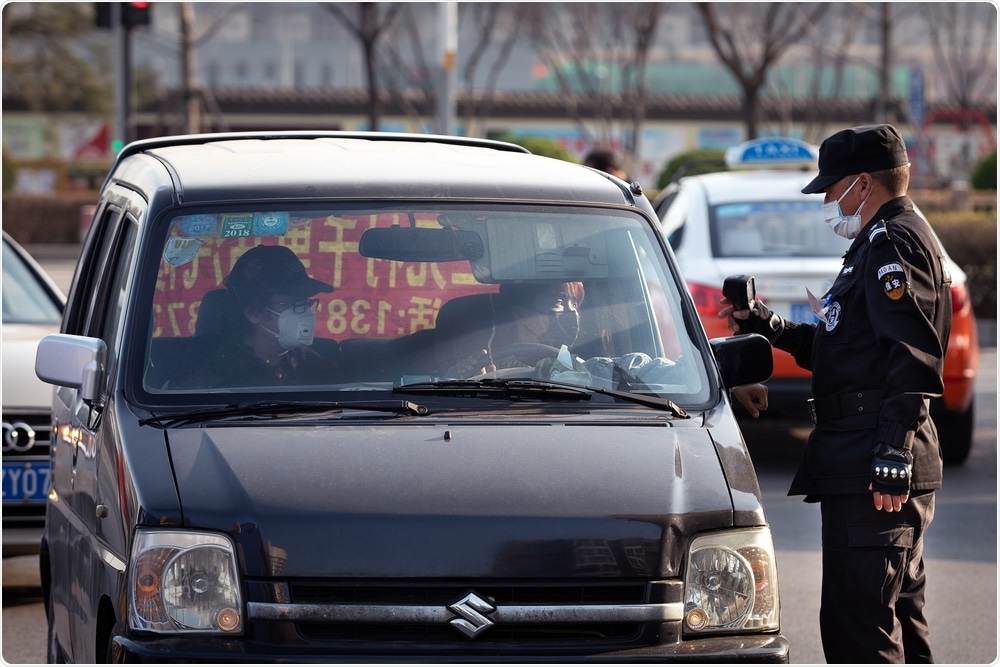China had started to return to normalcy after successfully "flattening the curve," with the government slowly easing restrictions and opening up the economy. However, Beijing has reported new clusters of coronavirus disease (COVID-19) cases, prompting the implementation of lockdown measures.
The World Health Organization (WHO) reports that Beijing has over 200 new cases of the viral illness, caused by the severe acute respiratory syndrome coronavirus 2 (SARS-CoV-2). This prompted the government to put more residential areas under lockdown and enhance testing in an attempt to contain the new outbreak.

A Policeman checking temperature during the COVID-19 outbreak in China (BEIJING). Image Credit: Openfinal / Shutterstock
The capital city of China has reported 44 new cases on June 16, bringing the total of 201 people in over five days.
A majority of the new cases have been tied to the city's largest wholesale market, Xinfadi. Local media reports pointed out that the virus was discovered on chopping boards utilized for imported salmon at the market. The reports have prompted supermarkets in the city to pull out the fish to prevent further virus transmission.
"The measures in Beijing are timely and effective. Those who are infected might show symptoms in the coming two days. If the number of reported cases does not increase much, it can be said the epidemic has stabilized at such a scale," Whu Zunyou, the chief epidemiologist of the Chinese Center for Disease Control and Prevention, said.
He added that the city had caught the outbreak early, imposing lockdown measures before the virus could spread at a rapid pace. However, he warned that there might be similar outbreaks in the future, citing that the Beijing outbreak is like that in Wuhan City, which also started in the market.
Lockdown measures
The government issued lockdown measures in the capital to contain the virus spread. Residential compounds near the wholesale and trading hub have been declared "high-risk." These areas have reinstated security checks and continued loudspeaker announcements, house visits, and phone calls, asking residents who have been to the Xinfadi market.
The city's authorities have raised the emergency response alert to level two, signaling the seriousness of the new outbreak. With the situation considered a severe public health emergency, the government will impose strict restrictions to control the spread of the coronavirus.
School closures were imposed, and temperature checks are being performed in malls and other public places. Also, long-distance bus services between Beijing and the rest of the country have been suspended. Those who live near the affected market and had been there for the past 14 days are not permitted to leave Beijing.
All restaurants, canteens, markets, and workplaces in the city have been instructed to perform deep cleaning and disinfection. Also, public places, such as galleries, museums, and parks, were instructed to run only at 30 percent of its maximum capacity.
Across the capital, markets are being inspected, with a total of 46 food markets tested for COVID-19. So far, all the samples turned out negative. Meanwhile, at least 6,000 staff and vendors from the Yuegezhuang wholesale food market in the Fengtai district were tested. The Tiantao Honglian food market has been shut down since a vendor tested positive with SARS-CoV-2 infection.
New Zealand records new case
New Zealand's fight against the coronavirus has gained praise from across the globe since it has reported zero COVID-19 cases for three weeks. The run has been cut short when two new cases were revealed.
The two women, who came from the United Kingdom, had been allowed to leave isolation in Auckland and took a road trip to Wellington before undergoing COVID-19 tests, which turned out positive. The women were from the same family and traveled to the country via Australia.
The women said they did not stop for fuel or supplies during the road trip. One of the women manifested mild symptoms before being tested, but it was tied to a pre-existing condition.
Prime Minister Jacinda Ardern admitted that there was a lapse in the protocols. She said that the women should not have been granted compassionate leave from isolation.
"Ultimately, after taking a look at what has happened here, there is already an expectation that no one leaves quarantine until they have completed their two weeks [isolation] and have been tested," Ardern said.
"Of course that was our expectation already, so that is where there is a failure in this case," she added.
So far, New Zealand has reported 1,506 confirmed cases, with 1,482 recovered and 22 deaths tied to COVID-19.